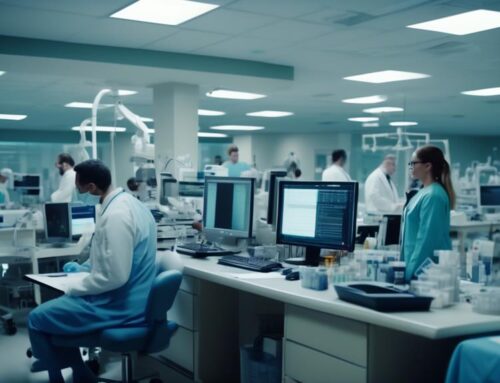Ever wondered how the gears behind the scenes of healthcare operate smoothly? Well, let’s take a step back and explore the pivotal role of medical data entry in this complex web of patient care. From maintaining accurate records to assisting doctors and facilitating insurance claims, medical data entry is like the unsung hero silently fueling the engine of healthcare. But why is it so crucial? How does it impact patient care? And what challenges does it present? Join us on this journey as we unravel the answers and shed light on the intricate world of medical data entry.
Maintaining Patient Records
To effectively manage patient care, it is essential to maintain accurate and organized patient records. Patient records play a crucial role in ensuring that healthcare providers have access to the necessary information to provide appropriate and timely care. With the advent of electronic health records (EHRs), maintaining patient records has become more efficient and secure.
One of the key advantages of EHRs is the improved protection of patient privacy. Electronic records are stored securely and can only be accessed by authorized personnel. This ensures that sensitive information, such as medical history and test results, remains confidential. Additionally, EHRs allow for granular access control, meaning that healthcare providers can limit access to specific sections of the record on a need-to-know basis, further enhancing patient privacy.
Furthermore, electronic records enable healthcare providers to easily update and retrieve patient information. This improves efficiency and reduces the risk of errors that can occur with paper-based records. With EHRs, healthcare providers can quickly access a patient’s medical history, medication list, and treatment plans, allowing for more informed decision-making and coordinated care.
Assisting Doctors
With accurate and organized patient records in place, medical data entry plays a crucial role in assisting doctors in providing quality care. By ensuring that medical documentation is accurate and up-to-date, doctors can make informed decisions regarding patient diagnosis and treatment plans. When doctors have access to comprehensive patient records, they can easily review medical history, medications, allergies, and previous test results, enabling them to provide more personalized and effective care.
Medical data entry also supports doctors by streamlining administrative tasks. By entering patient information into electronic health records (EHR) systems, doctors can easily access and update patient records, saving time and reducing the risk of errors. This allows doctors to focus more on patient care, rather than getting caught up in paperwork or searching for misplaced files.
Furthermore, medical data entry helps doctors track patient progress and outcomes more efficiently. By accurately recording treatment plans, medications prescribed, and test results, doctors can monitor patient responses and adjust treatment plans accordingly. This not only improves patient care but also enables doctors to make evidence-based decisions and provide recommendations based on historical data.
Ensuring Accurate Billing
Accurate billing is essential for healthcare providers to ensure proper reimbursement for services rendered. By improving efficiency and reducing errors in the billing process, healthcare organizations can enhance their financial stability and provide better patient care. Here are three reasons why accurate billing is crucial:
- Financial viability: Accurate billing ensures that healthcare providers receive the appropriate payment for the services they provide. This helps to maintain the financial stability of the organization, allowing them to invest in advanced technologies, hire skilled staff, and provide quality healthcare services.
- Patient satisfaction: Accurate billing plays a vital role in maintaining patient satisfaction. When patients receive accurate and understandable bills, they are more likely to trust the healthcare provider and have confidence in the quality of care they receive. This leads to improved patient experience and loyalty.
- Legal compliance: Accurate billing is essential to comply with healthcare regulations and laws. By ensuring accurate billing practices, healthcare organizations can avoid legal issues, penalties, and reputational damage.
To achieve accurate billing, healthcare providers can implement electronic medical records (EMR) systems, automate billing processes, and regularly train staff on coding and billing guidelines. These measures improve efficiency, reduce errors, and ultimately contribute to the financial stability and success of healthcare organizations.
Aiding in Patient Care
Improving patient care is a key benefit of accurate medical data entry in healthcare. By maintaining an efficient and accurate medical data entry system, healthcare facilities can enhance patient safety and overall quality of care.
Accurate medical data entry ensures that patient information is correctly recorded and easily accessible. This improves efficiency in healthcare settings by allowing healthcare professionals to quickly retrieve and review patient data, including medical history, allergies, and current medications. With this information readily available, medical professionals can make informed decisions about treatment plans, medication administration, and potential drug interactions.
Furthermore, accurate medical data entry helps enhance patient safety. It reduces the risk of medical errors, such as prescribing the wrong medication or administering the incorrect dosage. By having access to accurate and up-to-date patient data, healthcare providers can avoid potential adverse events and ensure appropriate care is provided.
In addition, accurate medical data entry enables better coordination of care among different healthcare providers. When patient data is accurately recorded and shared, it enables seamless transitions between healthcare settings, such as hospitals, clinics, and long-term care facilities. This improves continuity of care and reduces the likelihood of medical errors or gaps in treatment.
Facilitating Insurance Claims
Facilitating insurance claims is a crucial aspect of medical data entry in healthcare. Properly documenting and organizing patient information ensures that insurance claims are processed accurately and efficiently. Here are three ways medical data entry improves efficiency and reduces errors in insurance claims:
- Streamlining claim submission: Medical data entry allows healthcare providers to submit insurance claims electronically, eliminating the need for paper forms and reducing the risk of errors associated with manual data entry.
- Ensuring accurate coding: Accurate medical coding is essential for insurance claims to be processed correctly. Data entry professionals carefully assign the appropriate codes for procedures, treatments, and diagnoses, minimizing the chances of claim denials or delays.
- Verifying eligibility and coverage: Through medical data entry, healthcare providers can access insurance databases to verify patient eligibility and coverage. This ensures that only valid claims are submitted, reducing the likelihood of billing errors and claim rejections.
Frequently Asked Questions
How Does Medical Data Entry Contribute to Improving Patient Safety and Quality of Care?
Improving patient outcomes and enhancing communication are two key ways medical data entry contributes to patient safety and quality of care. By accurately inputting and organizing medical information, healthcare providers can make informed decisions and ensure seamless collaboration.
What Are the Potential Challenges or Risks Associated With Medical Data Entry in Healthcare?
You face challenges and risks in medical data entry. Mistakes can lead to errors in patient records, compromising their safety and care. It’s important to be cautious and accurate when entering data.
How Does Medical Data Entry Help in Monitoring and Managing Chronic Diseases?
Medical data entry helps you monitor and manage chronic diseases by capturing and organizing relevant patient information. This enables healthcare professionals to implement effective monitoring techniques and disease management strategies for better patient care.
What Are the Security Measures in Place to Protect Patient Confidentiality and Prevent Unauthorized Access to Medical Records?
To protect patient privacy and prevent unauthorized access to medical records, security measures such as data encryption are in place. These measures ensure that sensitive information remains confidential and secure.
How Does Medical Data Entry Support Medical Research and Advancements in Healthcare?
Medical data entry plays a crucial role in supporting medical research and advancements in healthcare. It helps researchers analyze large datasets for clinical trials, leading to improved treatments and personalized medicine options for patients.




